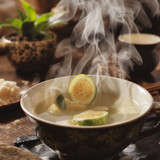

Starwest Botanicals
Organic White Tea Bags
White Tea Bags vs. Green Tea: Why They’re Different White tea and green tea come from the same plant—Camellia sinensis—but they’re made differently. That difference in processing is why white tea...
Apricot seeds, known as Nan Xing Ren (南杏仁) in Traditional Chinese Medicine (TCM), are the edible kernels found inside apricot pits. They are commonly used for respiratory health, digestion, and skin nourishment. Rich in beneficial compounds like amygdalin (vitamin B17), essential fatty acids, and antioxidants, apricot seeds are valued for their potential to support lung function, soothe coughs, and promote overall wellness.
| Category | Details |
|---|---|
| What Are Apricot Seeds (Nan Xing Ren)? | Apricot seeds, or Nan Xing Ren (南杏仁), are the inner kernels of apricot pits. Used for centuries in herbal medicine, they contain amygdalin (B17), fatty acids, and antioxidants. |
| What Is Nan Xing Ren Used for in Traditional Chinese Medicine? | In TCM, Nan Xing Ren is classified as slightly warm and bitter. It is used to moisten the lungs, relieve cough, and regulate digestion by removing phlegm and promoting circulation. |
| Health Benefits of Apricot Seeds | Apricot seeds are known for their potential to support lung function, aid digestion, provide antioxidant protection, and support the immune system. They are also valued for skin health. |
| How to Use Apricot Seeds (Nan Xing Ren) Safely | Nan Xing Ren should be consumed in moderation. Typically used in teas, soups, or powdered form, it should not exceed recommended doses due to amygdalin content, which can be toxic in high amounts. |
| Where to Buy High-Quality Apricot Seeds Online | For the highest quality apricot seeds, shop from reputable sources that provide lab-tested, organic, and non-GMO products. Look for freshness, purity, and proper storage conditions. |
| Chinese Medicine Theory & Why It Works | According to TCM, Nan Xing Ren works by dispersing stagnant Qi in the lungs and lubricating the intestines. It harmonizes the Lung and Large Intestine meridians, helping to clear phlegm and support overall vitality. |

Common Name: Apricot Seed, Apricot pit, Apricot kernel, Kuang Xing Ren, Bitter Apricot Seed
Botanical Name: Prunus armeniaca semen
Pin Yin Name: Nan Xing Ren, Xing Ren
Apricot Seed Dosage: Follow doctors instructions on how to use this herb.
Apricot Seed Precautions: Do not use if pregnant or nursing. Not recommend for small children. Apricot pit contains hydrogen cyanide which is strong toxin.
Apricot Seed Allergy Alert: Contains Tree Nuts

Apricot seed is traditionally used to relieve cough, expel phlegm and ease breathing. It moistens the intestines to relax the bowels. Apricot Seed's pin yin name Nan Xing Ren translates to Southern Xing Ren. Apricot seed may relieve cough and wheezing. It also benefits joint health, supports cardiovascular health and boosts the immune system.
Apricot Seed Properties: Slightly Warm, Bitter, Slightly Toxic
Apricot Seed Channels / Meridians: Lung, Large Intestine
Apricot Seed Chemical Components: Emulsin, amygdalase, γ-estradiol, α-estradiol, vitamin E
✅ Ingredients:
✅ Instructions:
Pro Tip: This tea is commonly used in TCM to moisten the lungs and relieve dry cough.
Yes, but only in moderation. Apricot seeds contain amygdalin (Vitamin B17), which converts to cyanide in the body. Excessive consumption may lead to toxicity. It’s best to follow recommended dosages—typically 2-3 seeds per day for general wellness.
Yes! In Traditional Chinese Medicine (TCM), Nan Xing Ren is used to moisten the lungs, dissolve phlegm, and relieve dry coughs. It is often combined with pear, licorice root, or honey in herbal teas for lung support.
Look for organic, lab-tested, non-GMO apricot seeds from trusted herbal suppliers. Ensure they are free from contaminants, properly dried, and stored for maximum potency.
Shop High-Quality Apricot Seeds Here. Forms and Sizes Below
References:
Herbpathy.com, alternativehealing.org
https://en.wikipedia.org/wiki/Apricot_kernel
https://pmc.ncbi.nlm.nih.gov/articles/PMC9332734/
https://www.sciencedirect.com/science/article/abs/pii/S2212429222007957